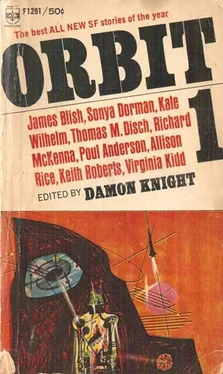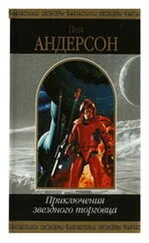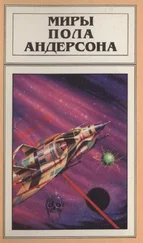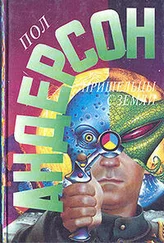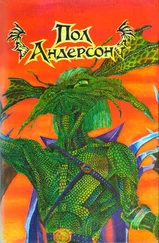Пол Андерсон - Orbit 1
Здесь есть возможность читать онлайн «Пол Андерсон - Orbit 1» весь текст электронной книги совершенно бесплатно (целиком полную версию без сокращений). В некоторых случаях можно слушать аудио, скачать через торрент в формате fb2 и присутствует краткое содержание. Год выпуска: 1966, Жанр: Фантастика и фэнтези, на английском языке. Описание произведения, (предисловие) а так же отзывы посетителей доступны на портале библиотеки ЛибКат.
- Название:Orbit 1
- Автор:
- Жанр:
- Год:1966
- ISBN:нет данных
- Рейтинг книги:4 / 5. Голосов: 1
-
Избранное:Добавить в избранное
- Отзывы:
-
Ваша оценка:
- 80
- 1
- 2
- 3
- 4
- 5
Orbit 1: краткое содержание, описание и аннотация
Предлагаем к чтению аннотацию, описание, краткое содержание или предисловие (зависит от того, что написал сам автор книги «Orbit 1»). Если вы не нашли необходимую информацию о книге — напишите в комментариях, мы постараемся отыскать её.
Orbit 1 — читать онлайн бесплатно полную книгу (весь текст) целиком
Ниже представлен текст книги, разбитый по страницам. Система сохранения места последней прочитанной страницы, позволяет с удобством читать онлайн бесплатно книгу «Orbit 1», без необходимости каждый раз заново искать на чём Вы остановились. Поставьте закладку, и сможете в любой момент перейти на страницу, на которой закончили чтение.
Интервал:
Закладка:
At the thought, Ulla turned to look back the way she had come that morning. The virus bubble flowed smoothly with the motion and the stars became brighter as it compensated for the fact that the sun was now at her back. She still could not see the base camp, of course. She had strayed too far for that, and in any event, except for a few wiry palps, it was wholly underground.
Now there was no sound but the creaking of the methane snow, and nothing to see but a blunt, faint spearhead of hazy light, deceptively like an Earthly aurora or the corona of the sun, pushing its way from below the edge of the cold into the indifferent company of the stars. Saturn’s rings were rising, very slightly awaver in the dark blue air, like the banners of a spectral army. The idiot face of the gas giant planet itself, faintly striped with meaningless storms, would be glaring down at her before she could get home if she did not get herself in motion soon. Obscurely disturbed, Dr. ‘Hillstrøm faced front and began to unload her sled.
The touch and clink of the sampling gear cheered her, a little, even in this ultimate loneliness. She was efficient — many years, and a good many suppressed impulses, had seen to that; it was too late for temblors, especially so far out from the sun that had warmed her Stockholm streets and her silly friendships. All those null adventures were gone now like a sickness. The phantom embrace of the virus suit was perhaps less satisfying — only perhaps — but it was much more reliable. Much more reliable; she could depend on that.
Then, as she bent to thrust the spike of a thermocouple into the wedding-cake soil, the second flying cloak (or was it the same one?) hit her in the small of the back and tumbled her into nightmare.
With the sudden darkness there came a profound, ambiguous emotional blow — ambiguous, yet with something shockingly familiar about it. Instantly exhausted, she felt herself go flaccid and unstrung, and her mind, adrift in nowhere, blurred and spun downward too into trance.
The long fall slowed just short of unconsciousness, lodged precariously upon a shelf of dream, a mental buttress founded four years in the past — a long distance, when one recalls that in a four-dimensional plenum every second of time is 186,000 miles of space. The memory was curiously inconsequential to have arrested her, let alone supported her: not of her home, of her few triumphs or even of her aborted marriage, but of a sordid little encounter with a reporter that she had talked herself into at the Madrid genetics conference, when she herself was already an associate professor, a Swedish government delegate, a 25-year-old divorcee, and altogether a woman who should have known better.
But better than what? The life of science even in those days had been almost by definition the life of the eternal campus exile. There was so much to learn — or, at least, to show competence in — that people who wanted to be involved in the ordinary, vivid concerns of human beings could not stay with it long, indeed often could not even be recruited. They turned aside from the prospect with a shudder or even a snort of scorn. To prepare for the sciences had become a career in indefinitely protracted adolescence, from which one awakened fitfully to find one’s adult self in the body of a stranger. It had given her no pride, no self-love, no defenses of any sort; only a queer kind of virgin numbness, highly dependent upon familiar surroundings and unvalued habits, and easily breached by any normally confident siege in print, in person, anywhere — and remaining just as numb as before when the spasm of fashion, politics or romanticism had swept by and left her stranded, too easy a recruit to have been allowed into the center of things or even considered for it.
Curious, most curious that in her present remote terror she should find even a moment’s rest upon so wobbly a pivot. The Madrid incident had not been important; she had been through with it almost at once. Of course, as she had often told herself, she had never been promiscuous, and had often described the affair, defiantly, as that single (or at worst, second) test of the joys of impulse which any woman is entitled to have in her history. Nor had it really been that joyous. She could not now recall the boy’s face, and remembered how he had felt primarily because he had been in so casual and contemptuous a hurry.
But now that she came to dream of it, she saw with a bloodless, lightless eye that all her life, in this way and in that, she had been repeatedly seduced by the inconsequential. She had nothing else to remember even in this hour of her presumptive death. Acts have consequences, a thought told her, but not ours; we have done, but never felt. We are no more alone on Titan, you and I, than we have ever been. Basta, per carita! — so much for Ulla.
Awakening in the same darkness as before, Ulla felt the virus bubble snuggling closer to her blind skin, and recognized the shock that had so regressed her — a shock of recognition, but recognition of something she had never felt herself. Alone in a Titanic snowfield, she had eavesdropped on an…
No. Not possible. Sniffling, and still blind, she pushed the cozy bubble away from her breasts and tried to stand up. Light flushed briefly around her, as though the bubble had cleared just above her forehead and then clouded again. She was still alive, but everything else was utterly problematical. What had happened to her? She simply did not know.
Therefore, she thought, begin with ignorance. No one begins anywhere else. . but I did not know even that, once upon a time.
Hence:
Though the virus bubble ordinarily regulated itself, there was a control box on her hip — actually an ultra-short-range microwave transmitter — by which it could be modulated against more special environments than the bubble itself could cope with alone. She had never had to use it before, but she tried it now.
The fogged bubble cleared patchily, but it would not stay cleared. Crazy moirés and herringbone patterns swept over it, changing direction repeatedly, and, outside, the snowy landscape kept changing color like a delirium. She found, however, that by continuously working the frequency knob on her box — at random, for the responses seemed to bear no relation to the Braille calibrations on the dial — she could maintain outside vision of a sort in pulses of two or three seconds each.
This was enough to show her, finally, what had happened. There was a flying cloak around her. This in itself was unprecedented; the cloaks had never attacked a man before, or indeed paid any of them the least attention during their brief previous forays. On the other hand, this was the first time anyone had ventured more than five or ten minutes outdoors in a virus suit.
It occurred to her suddenly that insofar as anything was known about the nature of the cloaks, they were in some respect much like the bubbles. It was almost as though the one were a wild species of the other.
It was an alarming notion and possibly only a metaphor, containing as little truth as most poetry. Annoyingly, she found herself wondering if, once she got out of this mess, the men at the base camp would take to referring to it as “the cloak and suit business.”
The snowfield began to turn brighter; Saturn was rising. For a moment the drifts were a pale straw color, the normal hue of Saturn light through an atmosphere; then it turned a raving Kelly green. Muttering, Ulla twisted the potentiometer dial, and was rewarded with a brief flash of normal illumination which was promptly overridden by a torrent of crimson lake, as though she were seeing everything through a series of photographic color separations.
Читать дальшеИнтервал:
Закладка:
Похожие книги на «Orbit 1»
Представляем Вашему вниманию похожие книги на «Orbit 1» списком для выбора. Мы отобрали схожую по названию и смыслу литературу в надежде предоставить читателям больше вариантов отыскать новые, интересные, ещё непрочитанные произведения.
Обсуждение, отзывы о книге «Orbit 1» и просто собственные мнения читателей. Оставьте ваши комментарии, напишите, что Вы думаете о произведении, его смысле или главных героях. Укажите что конкретно понравилось, а что нет, и почему Вы так считаете.
